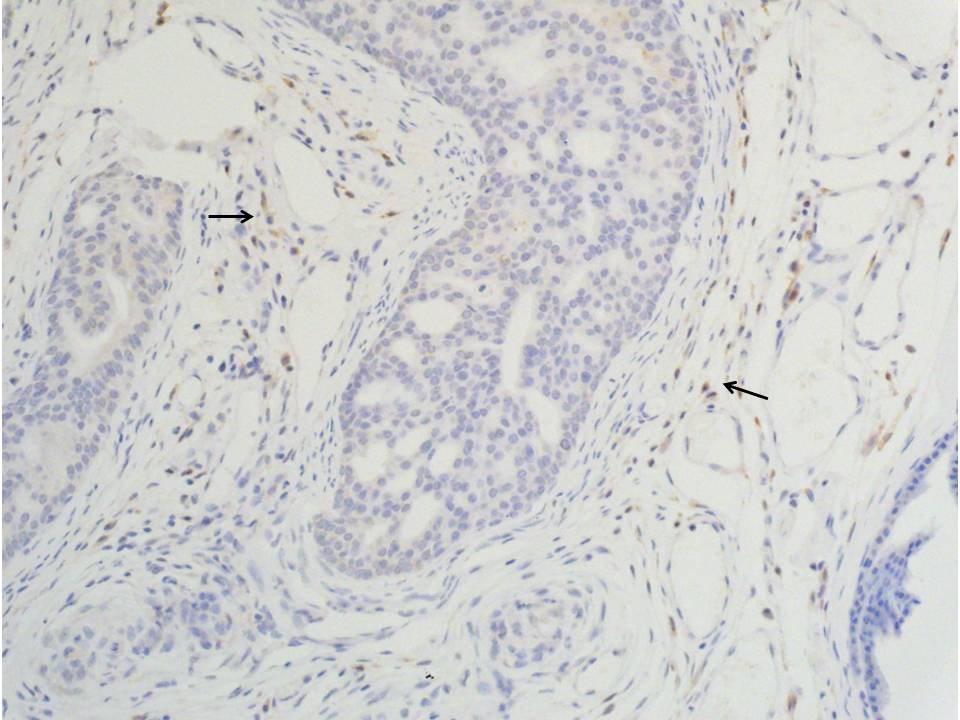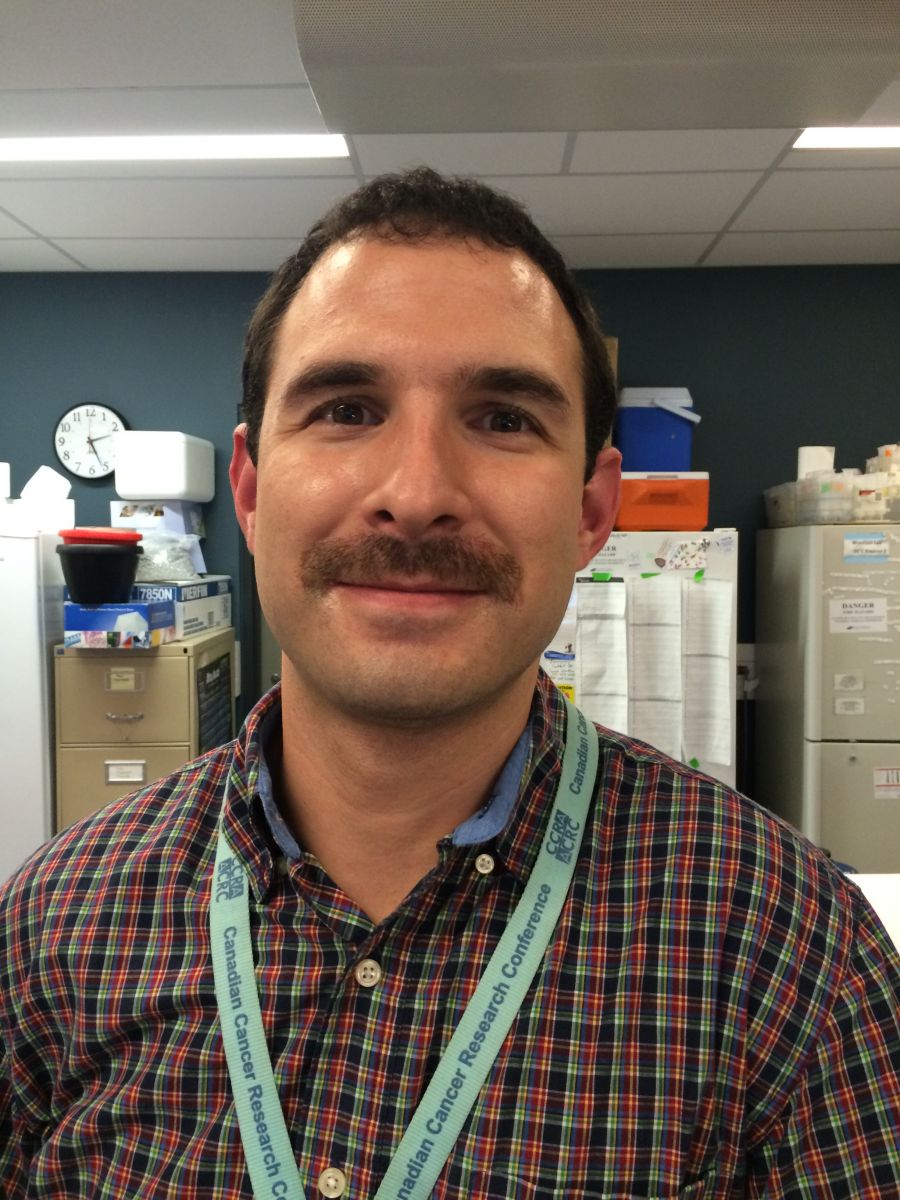Geoff Wood
Associate Professor, Department of Pathobiology at Ontario Veterinary College
We sat down with Geoff Wood, who is both a Pet Trust-funded researcher and a Movember Discovery Grant program recipient from Prostate Cancer Canada, to learn more about his research and to find answers about prostate cancer.
.jpg)
Geoff Wood growing his mustache in his lab on the University of Guelph campus
Prostate cancer is the most commonly diagnosed cancer among Canadian men, according to Prostate Cancer Canada, with one in eight diagnosed during their lifetime. Prostate cancer is a disease where some prostate cells have lost normal control of growth and division. A cancerous prostate cell features uncontrolled growth, abnormal structure and the ability to move to other parts of the body, or to metastasize.
“Many men live with early stage prostate cancer and manage the disease with a variety of different treatment options,” Wood says. “Prostate cancer can often become resistant to treatment over time and advance to a condition known as castration-resistant prostate cancer, or CRPC. “
In this advanced stage of the disease the cancer tends to not only be more aggressive, but it is also unresponsive to known therapies. Why and how prostate cancer becomes resistant to treatment over time is what Wood seeks to answer through his current research.
In early stage prostate cancer, one of the major first-line treatments involves androgen deprivation therapy. Androgens are defined as male sex hormones (such as testosterone). While early stage prostate cancers are likely to respond to androgen deprivation therapy, most cases – given that the patient lives long enough – will advance to CRPC.
“Progression to CRPC is often slow and patients living with early stage prostate cancer may die of natural causes or other diseases that commonly affect older men before the cancer becomes advanced,” Wood explains.
The progression to CRPC can be variable and it is currently unknown why some patients with prostate cancer progress to this stage, while others do not. Once the disease has progressed, it is usually fatal and commonly involves metastasis (the spreading of cancer to another part of the body).
During early stage treatments, anti-androgen drugs are administered and inflammation occurs in the prostate. The drugs cause the prostate to shrink, along with the tumour. One area Wood is investigating is how inflammation plays a role in keeping cancer cells alive until they become independent of androgens. Even though CRPC patients have low androgen levels, the tumour still signals through the same pathways. This is what makes treatment difficult; even though what is controlling the pathway (androgens) have been eliminated, the disease continues to worsen.
Finding a way to manage inflammation in prostate cancer patients may be the key to unlocking valuable answers. Many cancers have been linked to inflammation; for example, chronic colitis (inflammation of the lining of the colon) is a major risk factor for colon cancer, and there has been increasing evidence that prostatitis (inflammation of the prostate gland) may be a predisposing factor to developing prostate cancer.
Wood’s current research, published this December in The Prostate, provides important insights into the role of altered inflammation and protease activity (a category of enzymes) in promoting prostate cancer growth and invasion. He is now extending this work using human cell lines and a mouse model to examine how inflammation influences the development of CRPC. The results of his research show that prostate inflammation does play an important promoting factor in prostate cancer progression.
Photomicrograph of a mouse prostate tumour. Arrows indicate positive inflammatory cells (brown) that are within the connective tissue surrounding the lobes of tumour cells.
“One of our primary research goals is to look at how we can slow down the disease progression before it becomes resistant to treatment – which has extremely beneficial clinical applications,” Wood says. “Interestingly, it seems as though the biggest influx of inflammatory cells occurs when androgens are depleted. Investigating how to regulate that may be a way to control disease progression, but that is something we are still exploring,” he adds.
Christopher Pinelli, Laboratory Animal Pathology PhD student at OVC, shows his Movember support
While prostate cancer is uncommon in dogs, with less than one per cent developing the disease, Wood says the collaborative opportunities at the Ontario Veterinary College have a meaningful impact on a variety of his research projects.
As an Assistant Director of the Institute for Comparative Cancer Investigation at the University, Wood is also involved in the Companion Animal Tumour Bank. This is a Pet Trust funded project that houses samples from more than 600 cancer cases and offers access to tumour, blood and tissue samples which can be used for research purposes. Valuable case history and clinical data is also documented.
Since cancers develop naturally in both dogs and humans these samples and information could prove to be an invaluable resource to help find answers to many cancers such as prostate, lymphoma, osteosarcoma and others that affect both species.
“Our data is pointing more and more to inflammation as a key factor to unlocking the aggressive nature of treatment-resistant prostate cancer,” Wood says. “We hope further investigations examining the specific molecules involved will help us have a clearer understanding of the mechanisms driving this disease and provide insights into halting its progression.”
In 2013, Wood received $200,000 from Prostate Cancer Canada to fund his research. Wood’s PhD student, Christopher Pinelli, received a $40,000 Graduate Studentship Research Award from Prostate Cancer Canada this past June. Pinelli’s project explores the role of inflammatory molecules that may regulate androgen signaling in castration-resistant prostate cancer.
.jpeg)
University of Guelph pathobiology researchers sport their Movember support. Left to right: Nariman Deravi, Geoff Wood, Brandon Lillie, Jondavid De Jong and Stefan Keller.



